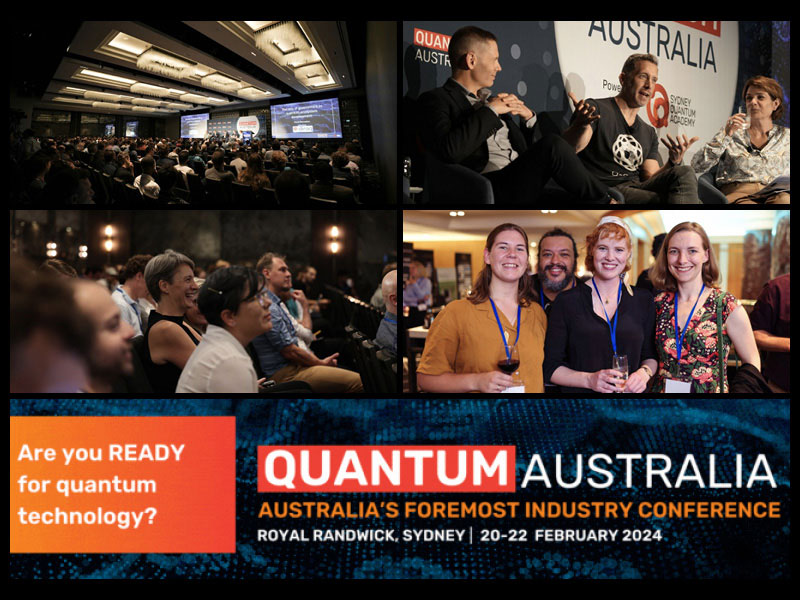Australia’s quantum researchers are attracting global attention, as evidenced by the line-up for Quantum Australia — a conference that has established itself as the country’s leading quantum industry event.
Now in its third year, the conference will highlight a burgeoning attention from the defence sector – partly driven by the new AUKUS defence pact between Australia, UK and US – as well as the blossoming enthusiasm for Australia’s technology savvy and thought leadership.
It will explore the theme ‘Accelerating impact: from research to commercialisation, and developing quantum technology markets’ from 20-22 February at the Royal Randwick Racecourse in Sydney.

Staged by Sydney Quantum Academy (SQA), a joint-venture of four Sydney research universities and the NSW government, Quantum Australia’s 2024 program brings together 50 speakers, including quantum entrepreneurs from Australia, Canada, Finland, USA and Singapore, the cream of Australia’s research luminaries and top government officials from Australia, UK and USA.
Among them is Minister for Industry and Science Ed Husic, Australia’s Chief Scientist Dr Cathy Foley, US Department of Homeland Security under-secretary Dr Dimitri Kusnezov, and Professor Peter Knight, strategic advisor for the UK National Quantum Technology Program, a new £2.5 billion collaboration between industry, academia and government. Together with Roger McKinlay, head of quantum technologies at peak research funder UK Research and Innovation, Professor Knight will be leading a strong British delegation to Sydney.
Notable entrepreneurs speaking include Dr Stephanie Simmons of Canada’s Photonic Inc, Dr David Gunnarsson of Finland’s Bluefors, Dr Chris Wood of US quantum start-up Infleqtion, and Professor Andre Luiten from QuantX in Adelaide; as well as local stars like Professor Michelle Simmons, CEO of Sydney-based Silicon Quantum Computing (and 2023 winner of the Prime Minister’s Prize for Science) and Prof Michael Biercuk, CEO of Sydney quantum start-up Q-CTRL.
There will also deep tech investors, like Main Sequence’s Bill Bartee and Quantonation’s Dr Christophe Jurczak, along with Amazon Web Services’ Seattle-based quantum lead Michael Brett, and many other prominent players.
One thing the booming quantum sector lacks globally is enough talent, according to SQA’s November 2023 report, the National Quantum Industry and Workforce Development Review. There is an urgent need for ‘quantum specialists’ who could come a range of scientific disciplines, such as physics, engineering, chemistry or maths, according to SQA’s CEO, Professor Peter Turner.
Crucially, the report also highlighted a need for “’technology translators’ — that is, graduates who can take quantum tech and turn it into products. This will be essential as the technologies mature and markets develop,” Professor Turner said.
Given the talent shortage hampering Australia’s potential to commercialise quantum applications, Professor Turner said partnerships between industry, universities and government hold the key.
“Universities need to listen to industry about the emerging skills needed, and governments need to provide the incentives and funding to ensure that Australia’s current lead in the technology crystallises into local jobs and real economic benefits,” he said.
This will help to meet the demand of emerging start-ups scouting talent in Australia, said the UK’s Professor Peter Knight. “You’ve got some of the very best research groups in the world in Australia, producing research students and post-doctorates, and you have done for decades — you’ve been pioneers in quantum science.
“Start-ups are hunting for talent in Australia because you’ve been the major engine of providing some of the brightest young people [and world leaders] in the field,” he added.
During the event, the UK government will be running a global expert mission to look at ways to foster and enhance collaboration between Australia and the UK in quantum research. In November, the UK and Australia signed a quantum technologies accord aimed at enhancing each country’s industry capabilities through improved information exchange and market access.
“This conference will be very important in identifying where the showstoppers and opportunities might be, and working towards trying to fix some of these things,” Professor Knight said.
Replacing the quantum hype with commercial realism is foremost in this give-and-take exercise.
“What I want to get out of it is a better understanding of the whole journey of potential collaborations – research, trainee stewardship, venture capital and early funding,” Professor Knight said.
“And what I want to leave as a message is that it’s a patient journey. We need at least a decade of patient investment, by which I mean private capital and government working in partnership to thinking about how this is going to be sustained.”
“Working out ways to build a trusted marketplace is specifically mentioned [in the accord], because if you’re going to commercialise this technology, making sure you have a marketplace where everybody respects intellectual property rights, and industry standards, will certainly be discussed.” he added.
A Careers Fair will also provide potential employers with a unique opportunity to engage with Australia’s in-demand emerging talent, early career researchers and students.
To register for the event, please visit https://quantum-australia.com/quantum-australia/register.
This article was produced by InnovationAus.com in partnership with Sydney Quantum Academy.
Do you know more? Contact James Riley via Email.
